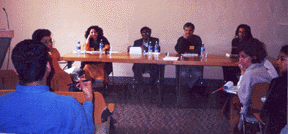Seminar focuses on environment and Dalits
SAN FRANCISCO -- India's environment and the Dalit movement were just two of the topics featured on the first day of a two-day workshop, 'Social Movements and Poverty in a Transnational Age', held at the University of California (UC) at Berkeley on April 13 and 14.
Dalits have not had opportunities for improvement, Guru said. They knew only a horizontal progression, he said, going from being street cleaners in rural areas to being street cleaners in cities.
The workshop was sponsored by the Center for South Asia Studies and featured participants from the University of Delhi, Pune University and Jawaharlal Nehru University in New Delhi. Academicians took part in six discussion sessions that looked at how third world social movements are affecting the mobilization of the poor and what part rapid economic changes play in the situation. Along with the environment and the Dalit movement, labor and politics in Kerala also came up on the first day of the workshop. The second day discussed women's and right-wing movements. Sociology professor Amita Baviskar of University of Delhi talked about the gap that exists between the poor and the need to protect the environment. She said it was ironic that the poor did not see how important the environment was to them even though they were the ones most victimized by environmental degradation. She said trade unions saw the Indian Supreme Court's call for environmental reforms as a roadblock to their ability to earn a living. Most trade unions responded that environment was an issue of the upper class, Baviskar said, adding: "They say we've been kicked in the stomach." She said it was unfortunate that those in power failed to see how the reforms affected the poor. But not only were the reforms costing jobs, they were also causing the disappearance of the slums, home to the very poor, she said. She added: "Housing doesn't get talked about as to how it relates to the environment." Gopal Guru, a professor of political science at the University of Pune who has written extensively about the Dalit movement, said the Indian government continued to ignore the Dalits despite holding a discussion in the 1970s on ways to address their marginalized status. Dalits have not had opportunities for improvement, Guru said. They knew only a horizontal progression, he said, going from being street cleaners in rural areas to being street cleaners in cities. A UC Berkeley assistant professor of political science, Pradeep Chibber, contested Guru's argument that Dalits have not experienced any upward mobility. He said a small percentage had risen to hold government positions. One of the reasons the Dalits, who comprise such a large population, have not been able to establish any political strength was because of factionalism in the Dalit movement, he said. "There are splits among the Dalit movement," Chhibber said, adding that thus they had failed to formulate sustainable long-term strategies. New York University associate professor of sociology Vivek Chibber reminded the audience of pre-colonial India in looking at the labor movement. It was a time when India launched headfirst into becoming an industrialized nation, he said. It was during the war with England that India was rife with labor unrest and workers were not afraid to go on strike, he said. Even before India had declared its independence, he said, there were talks aimed at giving the labor movement much broader rights, calling this a "class compromise." The labor movement agreed to cease its protests if workers' rights were guaranteed, including the right to collective bargaining. But that compromise did not come about because employers had enough resources that they did not have to bargain with the workers and just waited out the strikes, Chibber said. Within several years of winning independence, the nation's laborers found themselves at the mercy of the market and the government, he said. The lesson for laborers in India, he said, was that they could not look to the government for patronage and that they had to stand united against the market. Prof. Ruth Gilmore, a U.S. prisoner rights advocate, discussed the concept of Dalits' "social death' in that they exist almost outside of Indian society because they are looked upon as outcasts.
By SUKHJIT PUREWAL
 Panelists at a conference, 'Social Movements and Poverty in a Transnational Age' at the University of California (UC) at Berkeley on April 13. At table, from left: Raka Ray, who was the moderator; Gopal Guru, political science professor at Pune University; Pradeep Chibber, UC Berkeley assistant professor; and Ruth Gilmore, prison rights activist. (Photo: Sukhjit Purewal)
Panelists at a conference, 'Social Movements and Poverty in a Transnational Age' at the University of California (UC) at Berkeley on April 13. At table, from left: Raka Ray, who was the moderator; Gopal Guru, political science professor at Pune University; Pradeep Chibber, UC Berkeley assistant professor; and Ruth Gilmore, prison rights activist. (Photo: Sukhjit Purewal)
 Amita Baviskar, sociology professor at the University of Delhi.
Amita Baviskar, sociology professor at the University of Delhi.